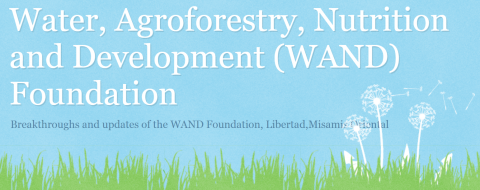Ecological sanitation for the base of the pyramid (Closing the loop between sanitation & agriculture in Mindanao, the Philippines using lactic fermentation)
2011 - 2012 • WAND (Water, Agroforestry, Nutrition and Development) Foundation, Inc.
Purpose
Exploring the viability of low-cost dry toilets and the use of human waste in small-scale agri-silviculture including crop trials; testing secondary treatment with vermi-composting and researching odour minimization.
Activities
We were one of the Grand Challenges Explorations Round 7 (GCE7) winners and received a US$100,000 grant from the Bill & Melinda Gates Foundation for to work on the project “Ecological Sanitation for the Base of the Pyramid”.
This project allowed us continuing our research on the high-grade production of human-waste-mixed organic fertiliser mentioned in my earlier post. But we did not only develop SaniFert, but carried out other activities and I would like to share here some experiences and results.
During 1 year (March 2011 – October 2012), we explored the viability of low-cost dry toilets and the use of human waste in small-scale agri-silviculture by designing and installing dry toilets, developing a process for high-grade fertiliser production from human faeces, conducting crop trials, testing secondary treatment with vermi-composting, researching odour minimization, and mainstreaming ecological sanitation in local micro-finance institutions.
Countries of activity
Location of main activity
Objectives
- To address the sanitation needs of the “base of the pyramid” (this means adopt the design, the double-vault ecosan toilets are too expensive in the Philippines),
- Provide not only access to sanitation; prevent the spread of diseases, and contamination, but also to make available much-needed fertiliser especially for small-scale farmers.
Further information
At present we are using our fertilizer product to reforest a 300 hectares mountain area in Initao, Misamis Oriental. So far the results are promising. This is part of our project is funded by the German Doctors for Developing Countries and the German Federal Ministry of Economic Cooperation and Development.
Furthermore, our current activities include:
- Continue designing versatile, robust and affordable ecosan toilets and to conduct comparison for serviced and non-serviced systems
- Expand ecosan re-use research for small-scale agriculture and agro-forestry
- Pilot a village-operated mini-laboratory for Ascaris detection as well as lactic acid bacteria and indigenous micro-organism production
- Start in-depth human waste-based organic fertilizer and feces cover formulation efficacy research
- Expand ecosan marketing to include other financing institutions such as cooperatives and commercial banks
- Conduct a more comprehensive market study, and
- Pilot the creation of “ecosan marketing and production hubs” to promote and market dry toilets.
Filter tags
Bill & Melinda Gates Foundation Camps (emergency or longer term) Composting, vermicomposting (solid waste), composting toilets East Asia & Pacific Emergency and reconstruction Faeces or faecal sludge Fertiliser Food security and productive sanitation Local NGO Peri-urban Practitioners Resource recovery Specific to one or several countries Toilets or urinals (user interface) Treatment of wastewater or greywater Urban informal settlements (slums) Urine Urine diversion dehydration toilets (UDDTs)
Links
Water, Agroforestry, Nutrition and Development Foundation, Inc.
Libertad, Misamis Oriental
Philippines
Uploaded by:
Elisabeth von Muench (Elisabeth)
















